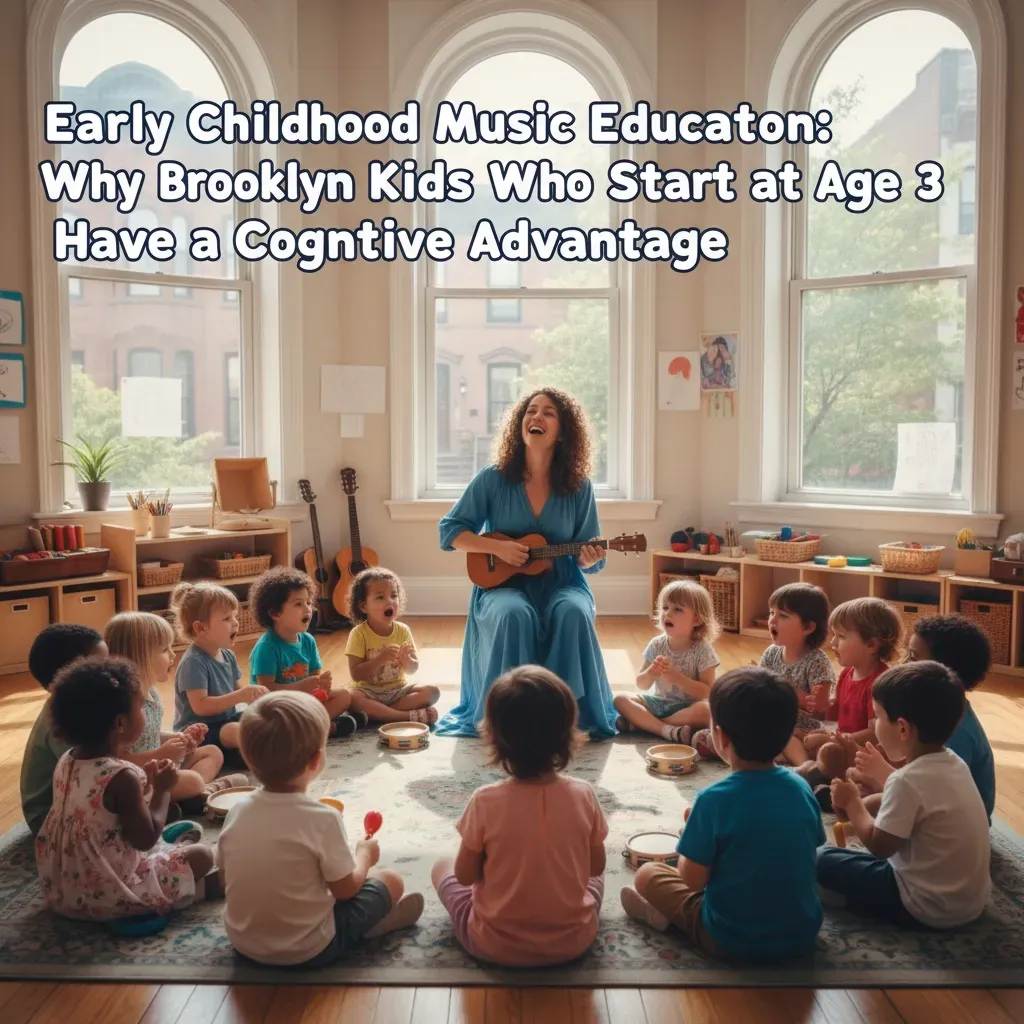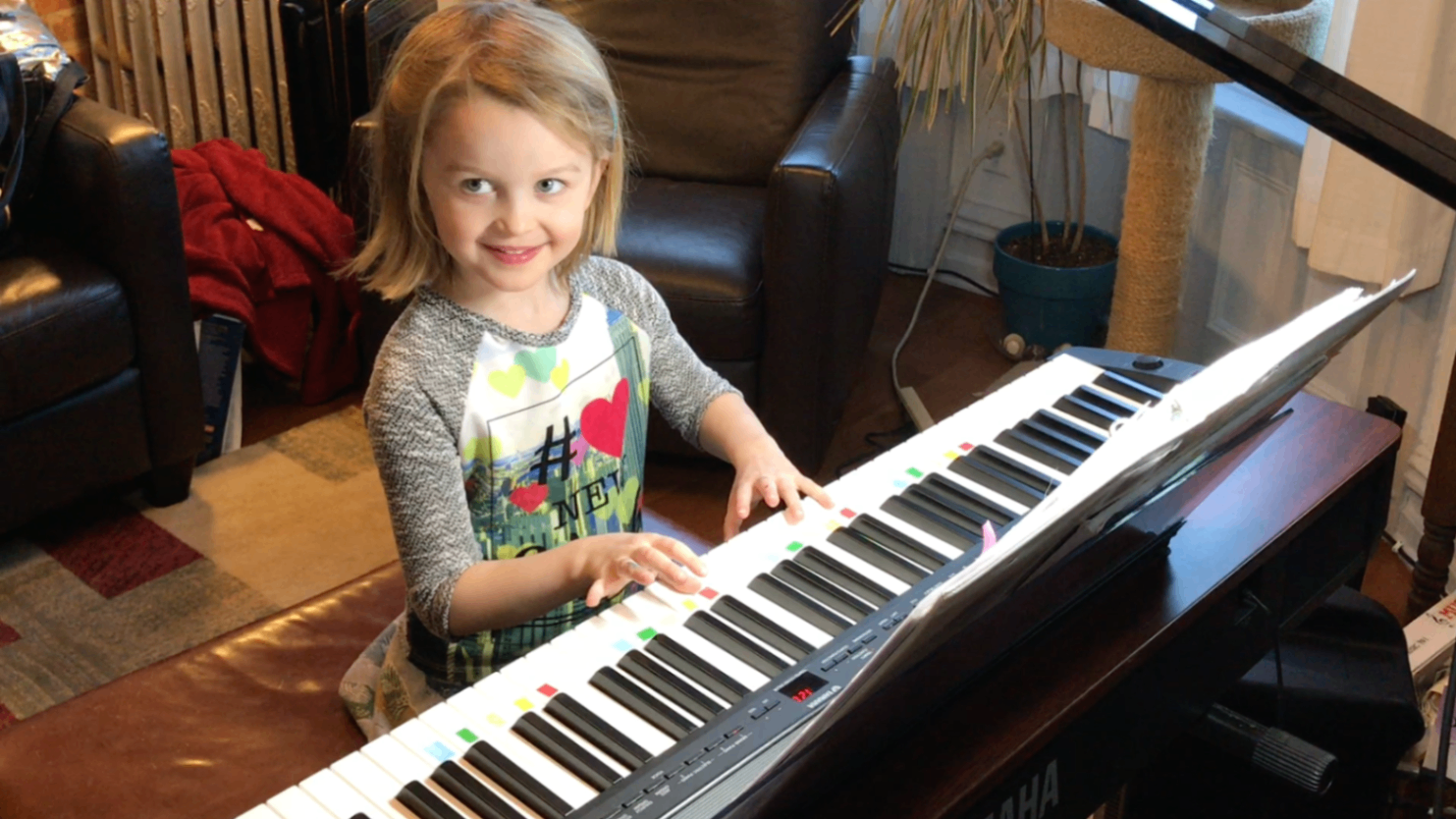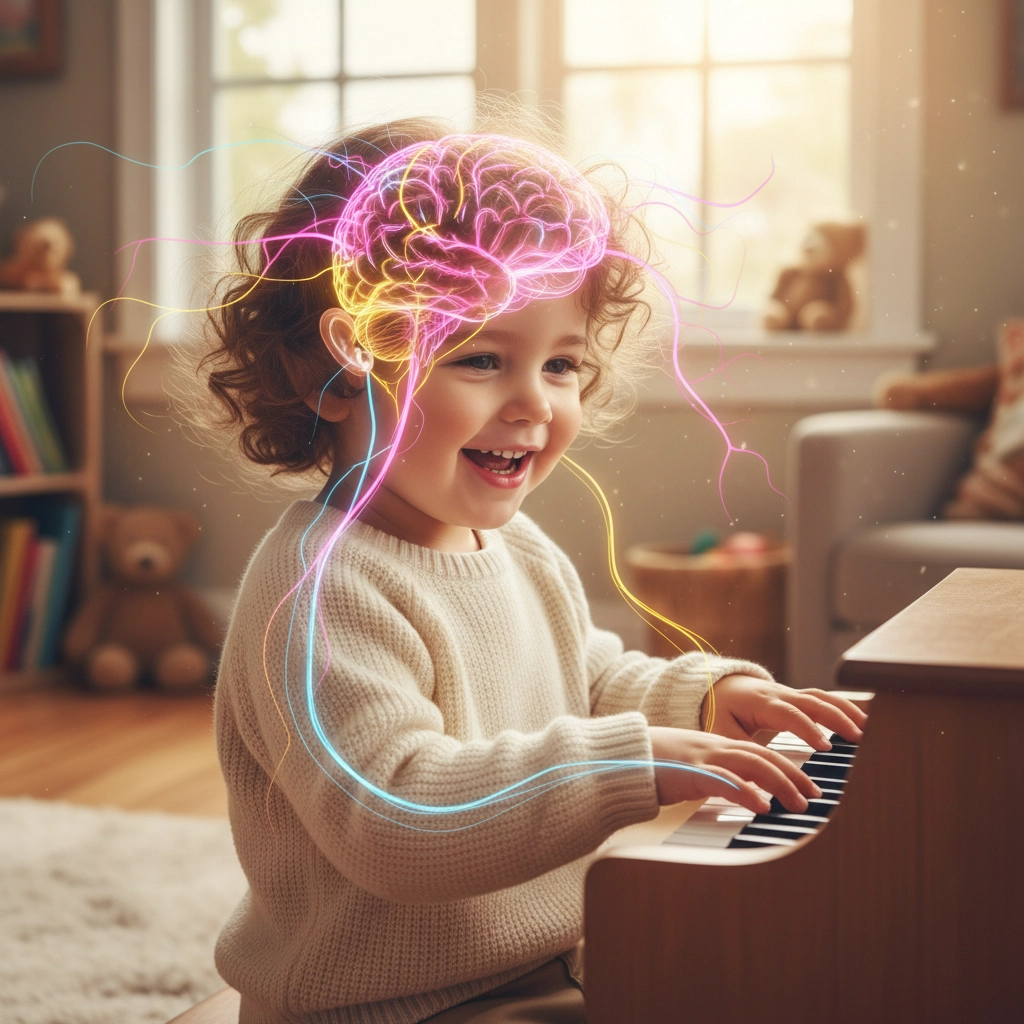
Early Childhood Music Education: Why Brooklyn Kids Who Start at Age 3 Have a Cognitive Advantage
If you're a Brooklyn parent wondering when to start your child's musical journey, science has a clear answer: age 3 is the sweet spot. While your toddler might still be mastering potty training, their brain is actually primed for one of the most powerful cognitive boosts available: early childhood music education.
Recent neuroscience research reveals that children who begin music lessons brooklyn families are seeking at age 3 don't just learn to play instruments: they literally rewire their brains for enhanced learning, memory, and problem-solving that lasts a lifetime.
The Brain-Building Power of Age 3
Your three-year-old's brain is operating like a supercharged pattern-detection machine. During this critical period, neural pathways are forming at lightning speed, and musical exposure creates connections across brain regions: particularly between the left and right hemispheres. When children engage with rhythm, melody, and musical patterns at this age, they're not just having fun: they're building the cognitive infrastructure that will support all future learning.
Studies show that babies' brains are naturally programmed as pattern-finding machines, and exposure to songs, rhythms, and musical patterns helps form crucial connections across neural networks. This early stimulation strengthens auditory processing, problem-solving, and emotional regulation that build throughout childhood.

Memory That Sticks: The Cognitive Advantages
Enhanced Memory Development
One of the most dramatic benefits of starting beginner piano lessons at age 3 is memory enhancement. Learning songs, rhythms, and melodies doesn't just help children remember music: it fundamentally improves their ability to retain and recall all types of information. Research demonstrates that just one year of music training improves verbal memory, and the rhythm and repetition inherent in musical learning strengthens overall memory skills.
When Brooklyn toddlers engage with music through the Musicolor Method, their brains form connections that aid in memorizing patterns, sequences, and rhythms: skills that transfer directly to academic subjects like reading and math.
Language and Speech Development
Music and language share the same neural pathways in developing brains. When three-year-olds participate in musical activities, they strengthen the very muscles that form speech while simultaneously expanding vocabulary and refining language skills. Children who practice piano differentiate consonants more accurately than those without musical training.

The interactive, call-and-response patterns common in early childhood music education help young learners develop speech patterns and memory retention that serve them throughout their educational journey.
Pattern Recognition and Early Math Skills
Almost every piece of music contains patterns and sequences built into melody and rhythm. When Brooklyn kids learn to anticipate these patterns at age 3, they're building critical foundations for both math and reading skills. Through music, children learn to recognize patterns in rhythm and melody, which directly translates to understanding numerical sequences, spatial relationships, and logical thinking.
Why the Musicolor Method Works Perfectly for Age 3
Traditional music lessons often rely heavily on abstract concepts that can frustrate young learners. The Musicolor Method transforms early childhood music education into a visual, tactile experience perfectly suited to how three-year-olds naturally learn.
Our color-coded approach means that instead of struggling with traditional notation, young children can immediately connect colors to sounds, making music accessible and enjoyable from the very first lesson. The visual markers help children understand musical concepts through multiple senses: exactly how toddler brains prefer to process information.

In-Home Learning Advantage
For Brooklyn families, in-home lessons provide the perfect environment for three-year-olds to explore music. Young children learn best in familiar surroundings where they feel secure and comfortable. Our teachers bring the Musicolor Method directly to your living room, creating a personalized learning experience that adapts to your child's unique personality and learning style.
This approach is particularly beneficial for children with special needs, who often thrive in familiar environments with individualized attention and visual learning supports.
Long-Term Cognitive Benefits That Last a Lifetime
The advantages of starting music education at age 3 extend remarkably into adulthood. Children who begin learning an instrument before age 7 tend to have greater neuroplasticity throughout their lives. Even more striking, approximately three years of childhood music lessons can fundamentally alter the nervous system in ways that persist decades later.

Research shows that adults with a history of childhood musical training demonstrate superior brainstem responses compared to individuals without such training: benefits that can extend up to seven years after formal lessons have ceased.
Academic Performance Boost
Brooklyn kids who start music lessons at age 3 consistently demonstrate:
Better memory, attention, and problem-solving skills
Higher IQ levels compared to non-musical peers
Advanced math achievement
Boosted English language arts and reading skills
Improved retention of verbal information
Increased standardized test scores
These aren't temporary improvements: they're lasting cognitive enhancements that compound over time as children progress through school.
Real Brooklyn Families, Real Results
Sarah, a Park Slope mom, started her daughter Emma with Musicolor Method lessons at age 3. "I was amazed how quickly Emma picked up patterns and sequences. By age 5, she was reading before most of her preschool classmates, and her kindergarten teacher commented on her exceptional listening skills and ability to follow complex instructions."
The beauty of starting early is that musical learning feels like play to three-year-olds. They're not aware they're building cognitive skills: they're just having fun with colors, sounds, and rhythm. This natural integration of learning and play creates positive associations with music and learning that last a lifetime.

Building Confidence and Discipline Early
Beyond cognitive benefits, three-year-olds who begin music education develop crucial character traits. Learning to practice regularly (even for just 10-15 minutes at this age) builds discipline and persistence. Successfully playing simple melodies builds confidence and self-esteem. These psychological benefits are just as important as the cognitive ones.
The Musicolor Method's emphasis on celebration and positive reinforcement helps young learners develop a growth mindset: the belief that abilities can be developed through dedication and hard work. This mindset becomes a powerful tool for tackling challenges throughout life.
The Brooklyn Advantage: Starting at 3
Brooklyn's rich cultural diversity and emphasis on early childhood development make it an ideal place for young children to begin their musical journey. Our borough values creativity, innovation, and holistic child development: principles perfectly aligned with early music education benefits.
When you combine the cognitive advantages of starting at age 3 with the Musicolor Method's visual, child-centered approach, you're giving your Brooklyn child a tremendous head start not just in music, but in all areas of learning and development.
Ready to Give Your Child This Cognitive Advantage?
If your child is approaching age 3 (or is already there), now is the perfect time to explore how music education can boost their cognitive development. The Musicolor Method makes learning music natural, fun, and accessible for even the youngest learners.
¿Hablas español? ¡También ofrecemos lecciones en español! We understand that Brooklyn families come from diverse linguistic backgrounds, and we're here to serve everyone in our community.
Ready to see how the Musicolor Method can give your child a cognitive advantage? Book a Call today to schedule a free consultation and discover how music lessons brooklyn parents trust can transform your child's learning potential. During this consultation, we'll discuss your child's interests, learning style, and how our visual, holistic approach can support their unique developmental journey.
Your three-year-old's brain is ready for this incredible cognitive boost: let's help them get started on a lifetime of enhanced learning, creativity, and confidence through music.
